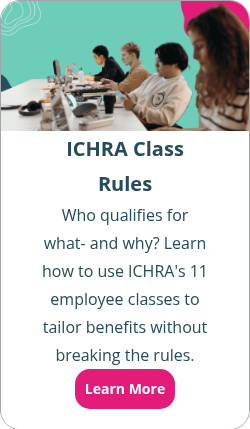Group health insurance vs. ICHRA
By Holly Bengfort on November 1, 2023 at 7:45 AM
Employee healthcare benefits play a crucial role in attracting and retaining talent, as well as promoting overall well-being in the workplace. Traditionally, group health insurance has been the go-to option for employers. However, the introduction of the individual coverage health reimbursement arrangement (ICHRA) in recent years has given organizations an alternative to consider.
Choosing between employer-sponsored group health insurance and an ICHRA requires careful consideration of various factors, such as cost, flexibility, and employee preferences. Both options have their pros and cons, and understanding them can help you determine which aligns better with your company's goals and resources.
In this article, we'll explore the differences between traditional group health plans and ICHRAs, giving you the information you need to decide on your employees' healthcare coverage.
What's an ICHRA?
An ICRHA is an IRS-approved, employer-funded health benefit that has been around since 2020. With an ICHRA, you can reimburse eligible employees tax-free for their individual health insurance premiums and other qualifying medical expenses.
With an ICHRA, employees purchase their own individual health insurance plans rather than relying on employer-sponsored coverage. They also purchase their own out-of-pocket medical costs. Then, they submit proof of their purchases. From there, you approve their eligible expenses and reimburse them up to a set allowance amount that you define.
It's a great solution for an applicable large employer (ALE) who needs to satisfy the Affordable Care Act’s employer mandate. You can offer an ICHRA as a stand-alone benefit to all your employees or a separate benefit for those who don’t qualify for your group health plan.
With an ICHRA, you can also divide your workforce into 11 employee classes. This allows you to offer different monthly allowance amounts to different employees. For example, you can separate full-time employees and part-time employees by employee classes.
You can also use employee classes to offer different benefits to different employees. For instance, you can offer a group health plan to one class of employees, such as salaried workers, while offering an ICHRA to hourly workers.
The ICHRA has no minimum or maximum contribution limit, giving you the freedom to offer any allowance amount to your employees. As long as your ICHRA allowance is considered affordable, it can satisfy the affordability portion of the employer mandate. Additionally, there are no participation requirements with an ICHRA, so you don’t need a certain number of employees enrolled in the benefit to offer it.
What is group health insurance?
A group plan is a type of health insurance that organizations provide to a group of people, typically employees or members. Individuals can't purchase their own group coverage.
When offering a health benefit, most employers go with group health insurance as part of their employee benefits package. According to the U.S. Census1, 54.3% of Americans had employer-sponsored group health insurance in 2021.
Employers purchase health insurance for employees and their dependents. Workers can choose to get coverage or not, but most plans need at least a 70% participation rate for the employer to offer it.
According to KFF2, the average annual premium for employer-sponsored health plans in 2023 is $8,435 for single coverage and $23,968 for family coverage. Employers and participants share the cost of insurance premiums.
How do group health insurance plans compare to ICHRAs?
So, what are the main differences between an employer-sponsored group health plan and an ICHRA? Let's take a closer look at seven key factors.
1. Cost
Group health insurance requires employers to contribute a set percentage of the monthly premiums, which can be costly for small businesses. On top of that, the cost of health insurance rises every year. Based on KFF data, the average cost of premiums for single and family coverage increased 7% in 2023.
ICHRAs help with cost control since you reimburse employees for insurance rather than purchasing it for them. Not only do you avoid annual rate hikes, but you also get to set your own predetermined budget for healthcare expenses. With no annual contribution limits, ICHRAs allow you to offer your eligible employees as much or as little as you choose. Plus, unused allowances stay with the employer at the end of the plan year or when an employee leaves the organization.
Employers also benefit from the larger health risk pool that comes with an ICHRA. With a traditional plan, high-risk employees can drive up premiums for the entire organization. Since employees purchase individual policies from the Health Insurance Marketplaces, the risk pool is much wider—usually anyone enrolled in the plan in an individual’s state. This keeps premiums low for high-risk employees, contributing to your benefit savings.
2. Tax benefits
Employers receive tax benefits for providing employer-sponsored health coverage to their employees. The portion of plan premiums that employers pay are tax-deductible as a business expense, while employees make contributions on a pre-tax basis, reducing their taxable income.
ICHRAs also have tax advantages for both employers and employees. They're tax-deductible and free of payroll taxes for employers. Since eligible employees must have an individual policy that meets minimum essential coverage (MEC) to participate in an ICHRA, their reimbursements are income tax-free.
3. Flexibility
Group health insurance often offers a limited selection of health plan options from a single health insurer. Additionally, these plans often have a network of preferred providers. While this can help reduce costs, it may limit the choice of healthcare providers for employees. They may need to seek care from providers within the network, which may not include their preferred doctors or specialists.
According to our 2022 Employee Benefits Survey Report, 65% of employees value being able to choose their own benefits. Yet, only 36% of respondents felt they had a say in their benefits.
With an ICHRA, employees can choose from a wider range of individual health plans on the Health Insurance Marketplace. From there, they can select the one that best suits their needs and preferences.
Employers also experience greater flexibility with an ICRHA. They can offer different allowance amounts to different classes of employees.
4. Portability
Group health insurance goes hand-in-hand with employment, which means that if an employee changes jobs or loses their job, they may lose their health insurance coverage. This lack of portability can be a significant disadvantage, especially for individuals who may have difficulty obtaining new coverage.
Unlike traditional group health insurance plans, an individual policy covered by the ICHRA is portable. This means that if an employee changes jobs, they can take their individual health insurance coverage with them. This provides individuals with continuity of coverage and eliminates the need to switch insurance plans whenever there is a change in employment.
On the employer side, ICHRA funds are not portable. This means that, unlike other account-based health benefits such as a health savings account (HSA), employees don’t keep their unused ICHRA funds when they leave your organization. This provides even greater cost savings.
5. Employee choice and personalization
Group health insurance often provides a one-size-fits-all approach by grouping all individual employees into the same plan. As a result, the plans may not provide the specific coverage that each individual requires. Employees may find that certain services or treatments they need are not covered or have limited coverage.
With ICHRA, employees have the freedom to select an individual plan that aligns with their healthcare needs, ensuring they have coverage for specific medications, doctors, or treatments.
6. Popularity and familiarity
Given the popularity of traditional group plans, most employees already understand how their coverage will work.
The ICHRA requires employees to navigate the individual health insurance market on their own. This can be overwhelming for those unfamiliar with choosing and managing their own individual insurance plans. It can also be time-consuming to research and compare different coverage options to find the best choice.
Thankfully, if you offer an ICHRA through PeopleKeep, we can provide you with resources to educate your employees on their new health benefits.
7. Administrative burden
Group health insurance requires employers to handle administrative tasks such as enrollment, claims, and compliance.
With an ICHRA, much of the administrative burden shifts to the individual insurance companies, reducing the employer's workload.
Plus, when you use an HRA administration software like PeopleKeep, managing your health benefit is quick and easy. We handle compliance, draft federally required plan documents, provide cloud-based document storage, and offer award-winning customer support. Our experts review employee reimbursement requests for you, ensuring they're spending your money as intended.
|
ICHRA |
Group health insurance |
|
|
What employers are eligible? |
Employers of all sizes with at least one W-2 employee. |
Employers of all sizes, though many plans have minimum participation requirements. |
|
What employees are eligible? |
W-2 employees with individual health insurance policies with MEC. |
Any employee of the employer's choosing. |
|
When can organizations enroll? |
Employers can enroll at any time of the year. Employees offered an ICHRA are eligible for a special enrollment period. |
Employers can enroll at any time of the year. |
|
Any contribution limits? |
No. |
No. |
|
Are there any minimum participation requirements? |
No. |
Yes. |
|
Taxation |
ICHRA reimbursements are tax-free. However, if an employee has an ICHRA they can’t receive premium tax credits (PTCs). |
Employee contributions are pre-tax. |
Conclusion
Ultimately, the choice between traditional group health coverage and the individual coverage HRA (ICHRA) depends on the needs of the business and its employees. Small businesses with limited budgets and diverse employee needs may find an ICHRA to be a more flexible and cost-effective option. However, larger companies with a more uniform workforce may still prefer the comprehensive coverage group health insurance offers.
It's important for employers to carefully evaluate their health insurance options, consult with insurance professionals, and consider the unique needs and preferences of their employees before making a decision. With the right type of plan, employers can maintain budget control while providing employees with proper health coverage.
Check out more resources
See these related articles

Which health reimbursement arrangement is right for your client?
Unsure about which HRA is best for your client? This guide breaks down the different HRA options to help you make an informed decision.

Should I still offer the QSEHRA when group insurance is cheaper than individual?
If group health insurance seems cheaper for your employees, should you still switch to a QSEHRA? Explore when the QSEHRA is a better choice.

Pros and cons of the individual coverage HRA
Considering an individual coverage HRA (ICHRA)? Discover the pros and cons of this healthcare option to make an informed decision.



